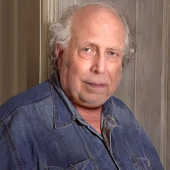Back to Editor profile » Professor Hyam Leffert
Professor Hyam Leffert

Professor Hyam Leffert
Department of Pharmacology, School of Medicine, University of California at San Diego, La Jolla, CA, USA
Professor Leffert attended the University of Rochester, Rochester, NY (B.A., Intellectual History, 1965), where he studied Necturus blood cells with Professor Ernst Caspari; Brandeis University, Waltham, Mass (M.A., Biology, 1967), where he reconstituted a primary immune response in vitro with Professor Gordon Sato; and the Albert Einstein College of Medicine, Bronx, NY (M.D.,1971), where he discovered a lecithinase-producing Bacillus cereus in a newborn suffering from Meningitis and bacteremia after ventriculoatrial shunt-revision (he identified the organism by its GC-base composition with Professor Julius Marmur). His internship at UCSD (La Jolla, CA, 1972) was split between Pediatrics, and Biology, where he developed selection methods to culture proliferation- and differentiation-competent primary hepatocytes for use as model systems of liver development and regeneration.
Dr. Leffert continued basic research at the Salk Institute, where, as an NCI/NIH/Damon Runyon Cancer Research Fellow and an Assistant Professor of Cell Biology, he directed liver growth control studies alongside many students, postdocs, and sabbatical visitors through 1980. Several growth factors were discovered (insulin, glucagon and epidermal growth factor; thereafter, insulin-like growth-factors IGF-I and IGF-II and TGF-α). Later studies provided molecular understanding of relationships between growth factors, regeneration and the expression and biochemistry of cyclins D1, B, A and E. Drs. Koch and Leffert, and Stewart Sell, UCSD Professor of Pathology, also observed expression of α-fetoprotein, a clinical marker of human hepatocellular carcinoma, in neonatal hepatocytes undergoing liver development in vitro and in vivo, and in normal long-term primary hepatocyte cultures simulating liver regeneration. Further work revealed that primary hepatocytes enzymatically converted chemical procarcinogens like N-Acetyl-2-Aminofluorene (AAF) into carcinogenic metabolites -- research that enabled precision drug metabolism studies by the pharmaceutical industry. In 1987, with Professor Ted Friedmann (UCSD Pediatrics), Dr. Leffert introduced genes into hepatocytes using retroviral vectors (initiating hepatic gene therapy research). Dr. Leffert was awarded a John Simon Guggenheim Memorial Fellowship, and a Morton Grossman Research Scholar Award by the American Gastroenterological Association, to study Molecular Cancer Genetics with Sir Henry Harris at the Sir William Dunn School of Pathology at Oxford University.
Currently, Drs. Leffert, Koch and Sell, are focused upon determination of pharmacokinetic growth cycle-dependent metabolic and covalent binding parameters of AAF, and the implication these new findings have with respect to translesion hepatocyte DNA synthesis and the chemical induction of hepatocellular carcinoma.
Updated 4 April 2024
